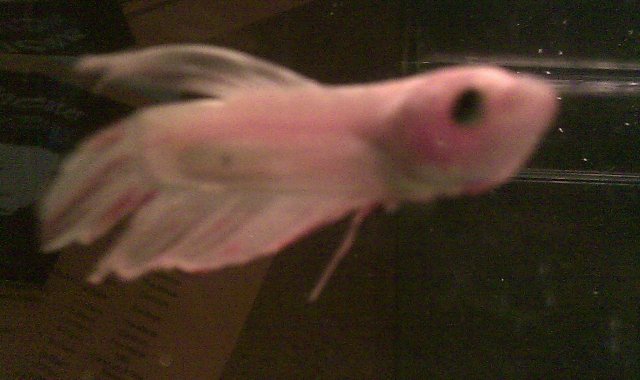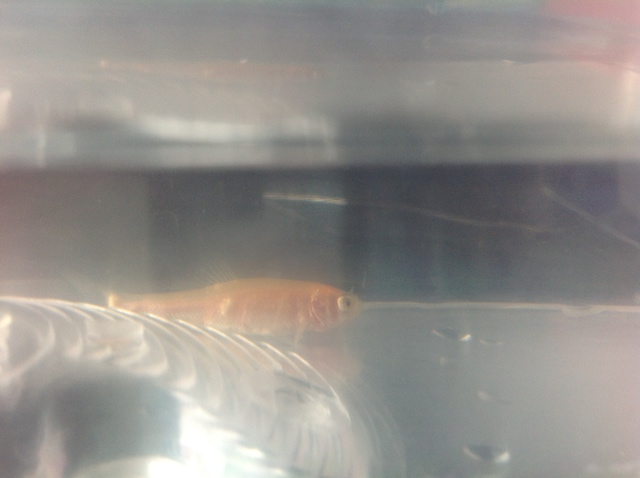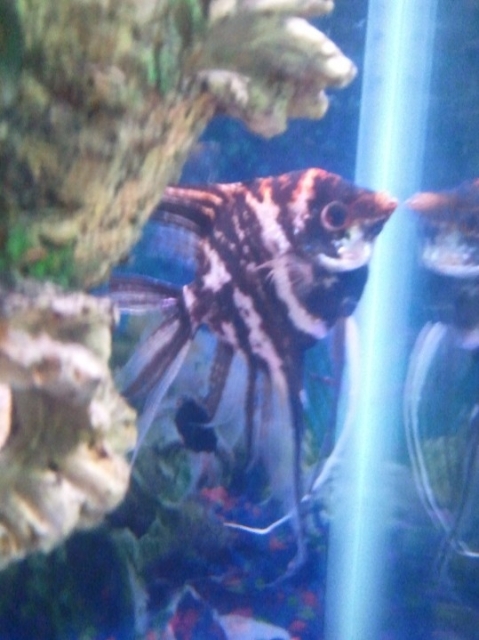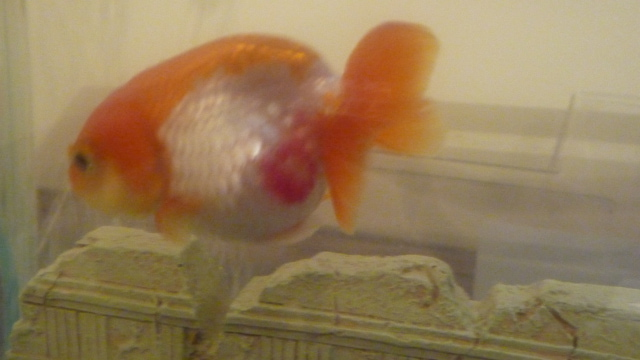QuestionQUESTION: Hello there,
I am new to fishes so I don't know much about fishes & here in Bangladesh, its very toucg to find about the exact solutions to fish related problems.I've a 2.5feet tank & I have different breeds of mollies(ex:dalmation,lyretails,balloon,swordtail),2 pairs of gouramis & 1 gold fish.I also had 15 guppies but last week all of them died.Can u tell me why all the guppies died?Even today a swordtail molly died.
And yesterday one of my black balloon molly gave birth to about 20babies. All of them are fine now.They are seperately kept in a jar.Here,its tough 2 find live worms 2 feed my fishes so I feed them those fish foods that are available.
It would be really nice of you to help me with some advice to keep my fishes healthy.I am absolutely clueless cause my fishes keep dying every now and then.
ANSWER: Hello Mehreen,
Freshwater fish are perhaps the easiest fish to care for in comparison to saltwater species because they are usually hardier fish. A basic aquarium set up will be required. You will need a tank, some rocks or substrate to line bottom of the tank. You will also need a filter, and some lighting. Based on the amount of fish you have, you want at least a 30 gallon tank. When choosing fish, it is imperative to make sure the fish are compatible. Not only do they need to be compatible for water temperature and P.H., but they also should have similar food requirements. Try to keep the fish relatively the same size. It has been said that if a fish is small enough to fit in another fishes mouth, that is usually where it ends up. Even fish that have been housed together for several months have been known to disappear on occasion. In regards to your guppies, chances are they were eaten, or at least picked on by the larger fish. Also, I do not know what temperature you keep your tank at as that was not provided, but I can tell you the guppies, goldfish, and tropical fish do not mix. Goldfish are coldwater fish. Tropical are, as the name obviously implies, "warm water" fish. Tropical fish prefer temperatures between 78-82, while goldfish prefer closer to 69-75. They also need a very different kind of food from tropical fish, and are much slower swimmers than most tropical fish so have a very high chance of being picked on as well. It would be best for you to buy a separate tank, at least 20 gallons, to house your goldfish. It's really a good idea to research as much information about how to care for any animal - including fish - before buying them.
Freshwater fish should be fed twice daily. Feed only a small amount that can be consumed within the first two to five minutes. Over feeding is a common mistake among novice fish keepers. Any excess food should be lifted with a net if possible, as it will become debris and quickly dirty the tank. Water should be kept regulated and tested weekly. Any problems in P.H. and water temperature should be corrected immediately in order to minimize stress caused to the fish.
Stress is significant because it causes illness in fish. It is the number one thing that we as fish keepers should try to keep to a minimum in our fish. It's important to monitor the activity and overall well being of the fish in an aquarium. The signs of stress will be fairly obvious. Slow moving or lethargic looking fish will require a stress coat that can be purchased at a local pet store. Try to avoid overcrowding (over stocking) the tank. This will help to reduce the amount of stress caused to the fish.
Change about a third of the water in the aquarium at a time, because this type of change will cause the least amount of disturbance to the fish and other inhabitants. This will need to be done once a weeks. Use either a bucket or a siphon to remove the water from the tank. Try to remove any loose or floating debris at this time. When adding the new water to the aquarium, be sure that it is within approximately two degrees of the tank water. The sides of the aquarium should be scrubbed regularly to remove an algae build up. Again be careful not to disturb the fish. Wash your hands thoroughly before and after handling the aquarium, and be sure not to leave any soap residue on your hands if they might touch the tank water. Lastly, check the manufacturer's recommendation on filters and change them accordingly. Filters collect any fish waste or left over food. They can't function properly unless they are clean. (Please do not mistake the filters to be tank maintenance, however. It is still your duty, every week, to change out at least 25-45 percent of the water)
Introduce hardy fish to a new tank. These fish can withstand higher nitrite levels that are present in a new aquarium. Choose fish such as danios, barbs, gouramis, and live bearers. Don't add more than three to four small fish per week. Acclimation times vary per species, so check with your retailer before adding any other new fish.
Lastly, your baby fish are not going to last for too long in a jar. The temperature can rise and drop much too quickly, and with all these baby fish laying their waste in this jar, it may quickly fill with ammonia. You should have a ten gallon tank for the babies. It does not need a filter - most filters are simply too strong for baby fish and can stress them out or possibly suck them in. It's a good idea not to fill the tank all the way, more around 6 or 7 inches of water until they are older. Floating plants are great because it allows them places to hide and reduce stress as well.
Hopefully this hashelped you to better understand the needs of your fish. And, please remember, do as much research as you possibly can on the care of an animal prior to actually purchasing it, because I can guarantee you - ALL animals require more care then simply feeding, watering, and cleaning. They all need it done in different ways, they all need different amounts of affection, and they all require different nutrients. Fish, for examples, are much more difficult to care for than simply putting them into a tank of water, feeding them, and hoping for the best.
---------- FOLLOW-UP ----------
QUESTION: Thank u very much for your answers.It had helped me 2 know a lot about fishes and their habbits.Well...my guppies were not eaten.they all died just within 15minutes.I shifted the molly fries into the tank inside a breeding net.And they seem to be good there. I have barbs,mollies and one single gold fish in my tank now.
My tank has all the things it needs...plants,rocks,heater,filter. Should I return the goldfish to the store?or can I keep it? Oh...I have 2 baby white angel fish?Will it be ok to keep them?or should I return them as well?
And I have a problem understanding the difference between a male fish and a female fish.How do I solve it?
It would be of great help if you can answer these following questions.
Thank you
mehreen
AnswerHello again Mehreen,
If you are unable to purchase a new tank for your goldfish, I do recommend finding him a new home. If you can return him to a store which knows a lot about fish, and refuses to sell them to people without the proper tanks for them, that would be best. The pet store I was working at, I had the right to say no if I thought the person wasn't going to be able to properly care for an animal, and I used that right often - even for fish! That way you can at least feel happy and comfortable in the thought that though you yourself may not be able to care for it properly enough to give it a long, healthy life, someone who can buy it will. Goldfish are very long lived, the oldest recorded being at 80 years of age! A goldfish should live no less than 12 years, if they are taken care of properly. They do not even reach adulthood until 3 or 4 years of age. So I am greatly saddened when someone tells me they had their goldfish for 1-2 years, and they think that is a long time - because truly it was still a baby.
I don't beleive you ever mentioned the size of your tank. If it is a 40 gallon or larger, you should be fine to keep those angelfish. If it is any smaller, you are likely to have problems in the future. Though angel fish are beautiful, they are rather aggressive, and very territorial. Now, keep in mind that every single tank is different, and there are many cases where an aggressive, territorial fish does just fine with smaller, more peaceful fish. But more often than not, it is just a bad idea. Your barbs should be fine, but remember - these are territorial as well, and can be just as aggressive as the angel fish. When a fish is territorial, they really need some amount of space to themselves. Just as people have their own personal "bubbles", some larger than others, so do fish. If a fish goes into an aggressive fish's "bubble", they are very likely to fight and one or both can be wounded or worse.
You can type each species of fish you own into a search engine, and find information about each one. This can be extremely helpful in knowing how to keep each fish alive, and knowing whether or not fish you would like to add will be compatible with fish you already own (though don't forget you must not over stock your tank). That's also why it's very important to know the name of each species of fish that you keep.
You can also use this method to find out more about sexing your fish. Some fish are much harder to tell than others. I still have trouble deciding whether a goldfish is male or female, as the only real way to tell is by their behavior, and the size of their anal hole. Not much fun.
As for mollies, it is rather easy, as males will have long, skinny anal fins called gonopodiums. Females will have smaller dorsal fins, and short, triangular shaped anal fins. They are also usually larger than the males in size.
There is one last thing you should know, is that mollies are brackish fish, and you should be adding aquarium salt to your tank. Aquarium salt is not the same as marine salt, rather, it replaces the natural salt that all freshwater fish have in their natural habitats. Tap water simply doesn't have as much as their freshwater homes do. It is also said that aquarium salt will help to reduce infection and parasites, which I believe it does, as I use it with my bettas. I have had my male for a little over 4 years now, and my female for two. They usually only live for around 2 years. They have never been ill.
Please use your resources as best you can, to learn more about the wonderful world of fish keeping. There is so much to know, and one person can never truly know it all! You will be amazed how much information you need to know to truly be a fish expert.
As always, best of luck and happy fish keeping.

 Eye Cloud?
QuestionBenny
QUESTION: Dear Jaymie,
As I have
Eye Cloud?
QuestionBenny
QUESTION: Dear Jaymie,
As I have
 My fish has weird bumps
Question
Side view Front view
Hi there! I
My fish has weird bumps
Question
Side view Front view
Hi there! I
 Sucky Fish with white fuzz
Question
sucky fish with white
I have a 30 gallon tank
Sucky Fish with white fuzz
Question
sucky fish with white
I have a 30 gallon tank
 My Sick Angel??
QuestionMy Angel
QUESTION: OK. So I have a 50 ga
My Sick Angel??
QuestionMy Angel
QUESTION: OK. So I have a 50 ga
 Red patches on Lionhead Goldfish
Questionlionhead goldfish red
lionhead goldfish
Red patches on Lionhead Goldfish
Questionlionhead goldfish red
lionhead goldfish